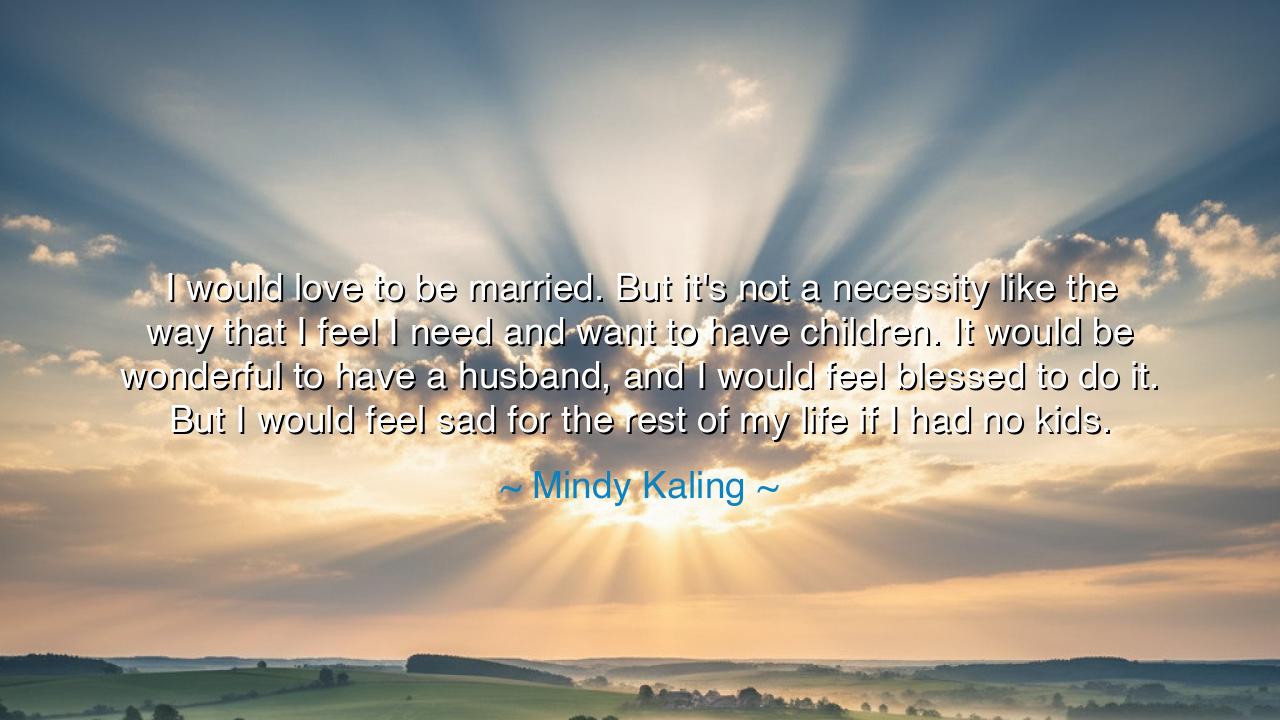
I would love to be married. But it's not a necessity like the way
I would love to be married. But it's not a necessity like the way that I feel I need and want to have children. It would be wonderful to have a husband, and I would feel blessed to do it. But I would feel sad for the rest of my life if I had no kids.






The words of Mindy Kaling carry both tenderness and gravity: “I would love to be married. But it’s not a necessity like the way that I feel I need and want to have children. It would be wonderful to have a husband, and I would feel blessed to do it. But I would feel sad for the rest of my life if I had no kids.” In these lines, she reveals the hierarchy of her longings, distinguishing between desire and necessity, between what would be a blessing and what would be the fulfillment of her very being. She speaks not only for herself but for countless souls who feel that the deepest call of life is not the union of marriage, but the act of creation, the bringing forth of new life.
The origin of her words lies in the timeless tension between societal expectation and personal truth. For centuries, women have been taught that marriage is the summit of their existence, the crown that gives them legitimacy and purpose. Yet here, Kaling disrupts that old order. She affirms that while a husband might be a joy, the essence of her longing lies elsewhere—in children, in legacy, in the continuity of love passed down through generations. It is a radical reshaping of values, for she names creation itself as her necessity, and companionship as her desire.
The ancients themselves would have nodded knowingly. In nearly every culture, the bearing of children was seen as the surest form of immortality, the way to extend one’s name and blood beyond the limits of death. In Greece and Rome, marriage was often a means to that end, not the end itself. Even in sacred scripture, the lament of barrenness rings louder than the lament of singleness, for to be without offspring was seen as the deepest sorrow. Kaling’s words echo this ancient cry: that without children, something essential would be missing, leaving a sorrow that no other blessing could heal.
History offers the story of Queen Elizabeth I, the Virgin Queen of England. She chose never to marry, declaring herself wedded to her kingdom. Yet though she ruled gloriously and left behind a legacy of power, she carried the weight of knowing she bore no heirs. The throne passed to another house, and her bloodline ended with her. Contrast this with women who bore children, even in obscurity—their names may be forgotten, but their legacy continues through the generations of sons and daughters who walk the earth. Here we see the sharp difference between the blessings of marriage and the enduring necessity of children.
Kaling’s words also contain a deep emotional truth about the heart. Marriage, though beautiful, depends on the union of two; it is vulnerable to chance, to failure, to the wills of others. But the longing for children can spring from a singular heart, an individual yearning to nurture, to guide, to love unconditionally. Thus, she names this longing as more elemental, more defining, and admits that without it she would carry sadness for all her days. Her honesty is both poignant and courageous, for it confronts the world with a hierarchy of needs that is not often spoken aloud.
The lesson is profound: each soul must discern what is truly necessary for its own fulfillment, rather than accept blindly the order handed down by tradition or culture. For some, it is marriage that brings wholeness; for others, it is children; for still others, it may be neither, but instead the birth of ideas, of art, of compassion into the world. What matters is not conformity to expectation, but honesty of heart, the courage to name what you truly cannot live without.
Practical action lies within reach: reflect deeply on your own longings. Ask yourself what you desire and what you cannot bear to lose, and do not confuse the two. Live in alignment with this truth, even if it challenges the expectations of family or society. And when you meet another who chooses differently, honor their path, for their necessity may not be your own. Above all, do not delay in pursuing what you deem essential, for life is fleeting, and sadness often springs from what was left undone.
So let us remember Mindy Kaling’s wisdom: marriage may be a blessing, but children—or the legacy of creation—are, for some, a necessity. Live with clarity about your own hierarchy of needs, and shape your life accordingly. For only when you honor your deepest truth can you walk without regret, carrying not sadness, but fulfillment, into the days of your life.






AAdministratorAdministrator
Welcome, honored guests. Please leave a comment, we will respond soon